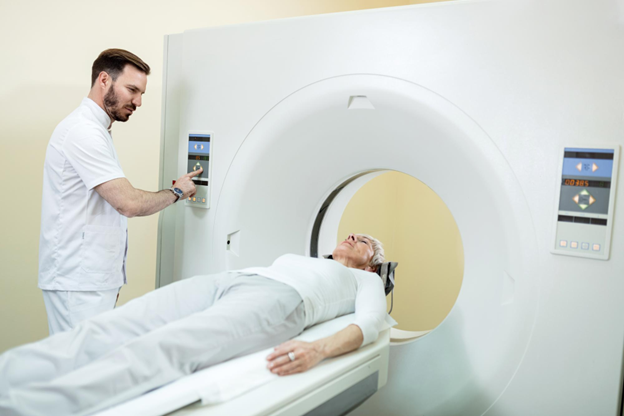Introduction
In today’s world of advanced technology, an MRI Brain Scan plays a crucial role in healthcare. This imaging technique uses magnets and radio waves to take detailed pictures of the brain. It helps doctors to see what’s inside without needing surgery. Understanding these scans can greatly help in early diagnosis of potential problems, aiding in quicker treatment. Whether it’s detecting tumors or checking for other brain-related issues, MRI Brain Scans are an invaluable tool in modern medicine. The scans not only ensure precise diagnosis but also contribute to crafting tailored treatment plans.
Decoding MRI Brain Scans
MRI Brain Scans use a technique called Magnetic Resonance Imaging. This method leverages powerful magnets and radio waves to create detailed images of the brain. Unlike a CT scan or regular X-rays, MRI scans provide clearer pictures, especially of soft tissues. This makes them essential for assessing brain health. Doctors use MRI Brain Scans to diagnose various conditions. They play a pivotal role in identifying strokes, brain tumors, and tracking ongoing health issues. For patients, the images from these scans are more than just snapshots—they’re keys to unlocking the mysteries of brain health. Unlike CT scans that use radiation, MRIs are a safer option, especially for frequent monitoring.
Behind the Scenes: How MRI Brain Scans Work
The science behind MRI Brain Scans is fascinating. It revolves around the alignment of hydrogen protons in our body. When you lie in the machine, these protons align and then realign when a radio signal is applied. This process emits signals that are captured and translated into images by the computer. Different sequences in the MRI tell doctors specific things about the brain, helping them look at various aspects effectively. These varied sequences make the MRI Brain Scan procedure highly adaptive to different diagnostic needs, providing a thorough view of brain activities and conditions.
Demystifying the MRI Brain Scan Procedure
An MRI Brain Scan procedure is straightforward and non-invasive. Before the scan, follow some basic guidelines like wearing comfortable clothing and removing metallic objects. Sometimes, you might have dietary instructions to adhere to. During the scan, you lie on a table that slides into a tunnel-like machine. In some cases, contrast materials are used to highlight specific areas in the brain. After the scan, medical experts will analyze the images for abnormal findings. It typically takes a few hours to several days to get your MRI Brain Scan results and understand their implications, based on the specific policies of healthcare facilities.
Maximizing the Benefits of MRI Brain Scans
The most significant benefit of an MRI Brain Scan is its excellent imaging quality, which delivers precise diagnostic insights. It’s a safe option even for kids and pregnant women as it doesn’t use any radiation. These scans are instrumental in diagnosing various ailments, including cancer, strokes, and infections. Advanced forms of MRI like functional MRI (fMRI) and Magnetic Resonance Angiography (MRA) offer enhanced views, aiding in detecting blood flow issues or brain functions. With its sophisticated capabilities, MRI ensures a thorough examination, therefore becoming a fundamental part of modern diagnostic practices.
Understanding Risks and Limitations
While MRI Brain Scans are largely safe, some risks exist. Some patients feel claustrophobic inside the machine, although modern, open MRI machines can be less intimidating. There’s also a slim chance of allergic reaction if contrast material is used. The cost can be high, and those with specific implanted medical devices might face contraindications. Solutions like the use of open MRIs provide comfort and cater to individual needs without compromising the quality of the scan, thus improving patient experience.
Why Opt for an MRI Brain Scan?
An MRI Brain Scan is ideal when accuracy and detail are required for the diagnosis. Unlike CT scans, MRIs give a clearer, more detailed view which is crucial for precise treatment planning. They help in crafting personalized treatment options as they offer more detail about the brain’s structure and activity. Common myths compare MRI unfavorably with CT, but MRIs offer distinct advantages, especially for neurological assessments. Understanding these benefits can ease the decision-making for undergoing an MRI, underlining why it stands out in the medical field.
Creating Comfort: Preparing for an MRI Scan
Preparing for an MRI Brain Scan can be smooth with a few key steps. Relax by practicing deep breathing or listening to music. Communicate openly with your technician about any fears. Follow simple tips like avoiding metallic clothes or accessories for a comfortable experience. Guiding patients to prioritize comfort and accurate readings, these tips are vital to reducing stress and ensuring a smooth procedure.
Conclusion
An MRI Brain Scan remains a cornerstone in effective brain imaging, offering invaluable insights into brain health. Patients should actively discuss MRI options with their healthcare providers to maximize benefits and understand procedures better. As MRI technology advances, we can expect even clearer images and more accurate diagnostics. This evolution not only promises improved patient care but also broadens our understanding of complex neurological conditions. Ultimately, MRIs are not just diagnostic tools—they’re pathways to better health outcomes.
Schedule your test today at Magnus diagnostic centre for expert guidance!

